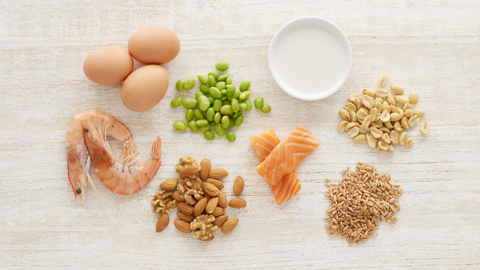Colic and Breastfeeding: How Your Diet Can Affect Your Baby's Comfort
Breastfeeding is a beautiful experience, but it can also be overwhelming for new moms, especially when their babies are colicky. Colic is a common condition that affects many babies, causing them to cry uncontrollably for hours on end. Colic is not only distressing for the baby but can also be frustrating and exhausting for the parents. While colic can have various causes, research suggests that breastfeeding mothers' diets may play a significant role in causing or alleviating colic symptoms. In this article, we will discuss how your diet can affect your baby's comfort and what you can do to prevent or ease colic symptoms.
What is Colic?
Before we delve into how your diet can affect colic symptoms, let's first understand what colic is. Colic is a term used to describe excessive crying in otherwise healthy babies. Colicky babies often cry for more than three hours a day, three days a week, for at least three weeks. Colic usually starts around the second or third week of life and peaks at six weeks, with most babies outgrowing it by three to four months.

The exact cause of colic is unknown, but it is believed to be due to the baby's immature digestive system, food intolerance or allergies, overstimulation, or gas. Symptoms of colic include inconsolable crying, clenching of fists, arching of the back, and pulling up the legs towards the belly.
How Your Diet Can Affect Your Baby's Comfort
Breastfeeding mothers' diets can affect their babies' digestive systems, leading to colic symptoms. Here are some ways in which your diet can affect your baby's comfort:
1. Consuming Gassy Foods
Some foods that are known to produce gas in adults can also affect babies when consumed by breastfeeding mothers. These foods include cabbage, onions, broccoli, beans, and cauliflower. When you consume these gassy foods, the gas can pass to your baby through breast milk, leading to discomfort and colic symptoms.
2. Consuming Dairy Products
Dairy products contain a protein called casein that can cause colic symptoms in some babies. If your baby has a dairy allergy or intolerance, consuming dairy products can lead to colic symptoms. If you suspect that your baby is sensitive to dairy, consider eliminating dairy products from your diet and see if the colic symptoms improve.
3. Consuming Caffeine
Consuming caffeine in excess can lead to colic symptoms in some babies. Caffeine can make babies irritable and fussy and can also interfere with their sleep. If you are a coffee or tea lover, consider limiting your caffeine intake or eliminating it altogether to help ease colic symptoms in your baby.
4. Consuming Spicy Foods
Spicy foods can cause gastrointestinal distress in some breastfeeding mothers, leading to colic symptoms in their babies. If you notice that your baby becomes fussy after you consume spicy foods, consider limiting your intake of spicy foods.
5. Consuming Allergenic Foods
Some breastfeeding mothers' diets may contain allergenic foods that can cause colic symptoms in their babies. These foods include peanuts, tree nuts, eggs, and fish. If you notice that your baby becomes fussy after you consume these foods, consider eliminating them from your diet and see if the colic symptoms improve.
How to Prevent or Ease Colic Symptoms
If you suspect that your diet is causing colic symptoms in your baby, consider making some dietary changes to prevent or ease the symptoms. Here are some tips to help you prevent or ease colic symptoms:
1. Keep a Food Diary
Keeping a food diary can help you identify which foods trigger colic symptoms in your baby. Write down everything you eat and drink, along with your baby's symptoms, and see if there is a pattern. Once you identify the foods that cause colic symptoms, eliminate them from your diet.
2. Eat a Balanced Diet
While you may need to eliminate certain foods from your diet, it is essential to eat a balanced diet to provide your baby with the necessary nutrients. Include plenty of fruits, vegetables, whole grains, and lean protein in your diet.
3. Drink Plenty of Water
Staying hydrated is crucial for breastfeeding mothers. Drink plenty of water throughout the day to help with digestion and keep your milk supply up.
4. Eat Smaller, Frequent Meals
Eating smaller, frequent meals can help with digestion and prevent overloading your baby's digestive system.
5. Try Herbal Tea
One solution that has been gaining popularity in recent years is baby colic tea. Secrets of Tea offers a range of baby colic teas that are specially formulated to help soothe and calm fussy babies. These teas are made from natural ingredients and are free from harmful chemicals and additives, making them a safe and effective solution for baby colic. The benefits of baby colic tea include reducing gas and bloating, calming the digestive system, and promoting better sleep for both the baby and the parents. With Secrets of Tea's baby colic tea, parents can help their little ones feel more comfortable and happy.
Conclusion
Breastfeeding is an essential part of your baby's growth and development, and your diet plays a crucial role in your baby's comfort. While colic can be distressing for both you and your baby, making some dietary changes can help prevent or ease colic symptoms. Keep a food diary, eat a balanced diet, stay hydrated, eat smaller, frequent meals, and try Herbal Tea to help ease colic symptoms. Remember, every baby is different, and what works for one may not work for another. Consult your pediatrician if you have any concerns about your baby's health.
FAQs
Can colic be cured?Can formula-fed babies get colic?
How long does colic last?
Does breastfeeding cause colic?
Can changing the breastfeeding mother's diet help with colic?










اترك تعليقا